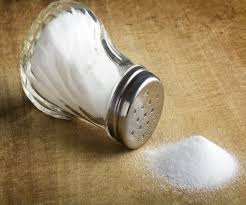- Home
- Editorial
- News
- Practice Guidelines
- Anesthesiology Guidelines
- Cancer Guidelines
- Cardiac Sciences Guidelines
- Critical Care Guidelines
- Dentistry Guidelines
- Dermatology Guidelines
- Diabetes and Endo Guidelines
- Diagnostics Guidelines
- ENT Guidelines
- Featured Practice Guidelines
- Gastroenterology Guidelines
- Geriatrics Guidelines
- Medicine Guidelines
- Nephrology Guidelines
- Neurosciences Guidelines
- Obs and Gynae Guidelines
- Ophthalmology Guidelines
- Orthopaedics Guidelines
- Paediatrics Guidelines
- Psychiatry Guidelines
- Pulmonology Guidelines
- Radiology Guidelines
- Surgery Guidelines
- Urology Guidelines
Heavy salt intake related to increased risk of stroke mortality

Increased salt intake and an increment of Sodium ingestion by 100 mmol/d were associated with an increased risk of stroke incidence and stroke mortality, according to a new study.
The study, published in the journal BMC Cardiovascular Disorders, further finds that low sodium intake was related to an increased risk of cardiac death, while moderate or heavy sodium intake was related to an increased risk of stroke mortality.
Also Read: Reducing salt intake to very low levels increases mortality risk
Sodium, the key element found in salt, has been documented as a modifiable risk factor for blood pressure which in turn, impacts the progression of cardiovascular disease (CVD). The currently WHO recommended sodium intake is < 2 g/d, which is based on the small and short-term clinical trials evaluating the effect of modest salt reduction on blood pressure in the general population. However, the effect of dietary sodium intake on subsequent cardiovascular morbidity and mortality is limited and inconclusive.
Zhiqiang Li, Beijing Children’s Hospital, Capital Medical University, National Center for Children’s Health, Beijing, China, and colleagues conducted the study to summarize the strength of association between sodium intake and cardiovascular morbidity and mortality.
For the purpose, the researchers searched PubMed, Embase, and the Cochrane Library systematically to identify the relevant studies up to October 2017. The effect estimates for 100 mmol/day increase in sodium intake were calculated using 95% confidence intervals (CIs) of cardiac death, total mortality, stroke, or stroke mortality for low (< 3 g/d), moderate (3–5 g/d), or heavy (> 5 g/d) sodium intake, and minimal sodium intake comparison.
A total of 16 prospective cohort studies reported data on 205,575 individuals.
Also Read: Potassium-containing salt-substitutes in diet reduce BP
Key Findings:
- An increase in sodium intake by 100 mmol/d demonstrated little or no effect on the risk of cardiac death and total mortality.
- The risk of stroke incidence and stroke mortality was increased significantly by 100 mmol/day increment of sodium intake.
- Low sodium intake was associated with an increased risk of cardiac death, while moderate or heavy sodium intake was associated with an increased risk of stroke mortality.
"Future studies focusing on specific populations for analyzing the secondary prevention of major cardiovascular outcomes are warranted," concluded the authors.

Disclaimer: This site is primarily intended for healthcare professionals. Any content/information on this website does not replace the advice of medical and/or health professionals and should not be construed as medical/diagnostic advice/endorsement or prescription. Use of this site is subject to our terms of use, privacy policy, advertisement policy. © 2020 Minerva Medical Treatment Pvt Ltd